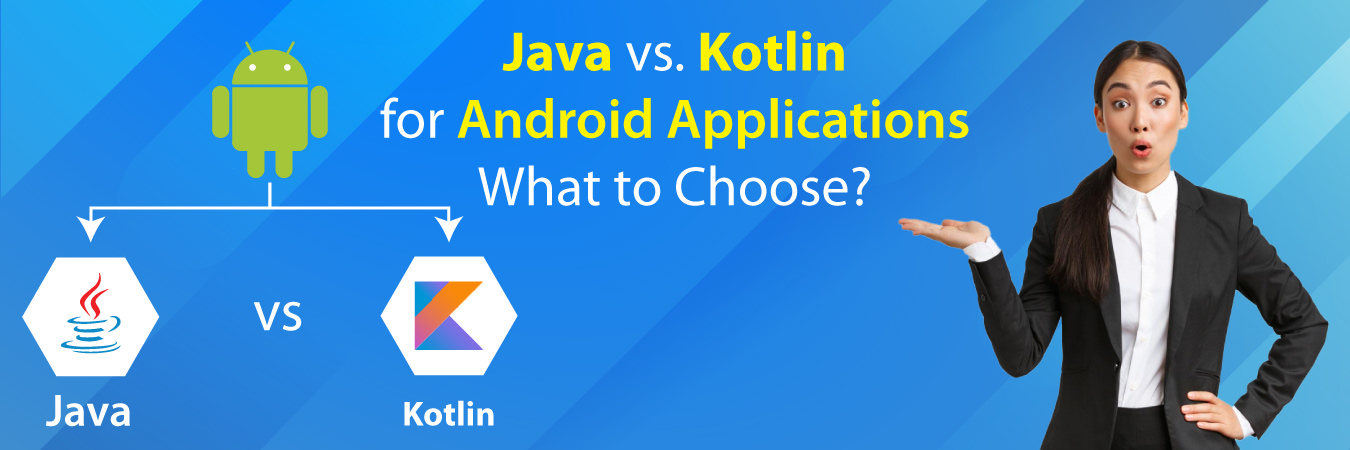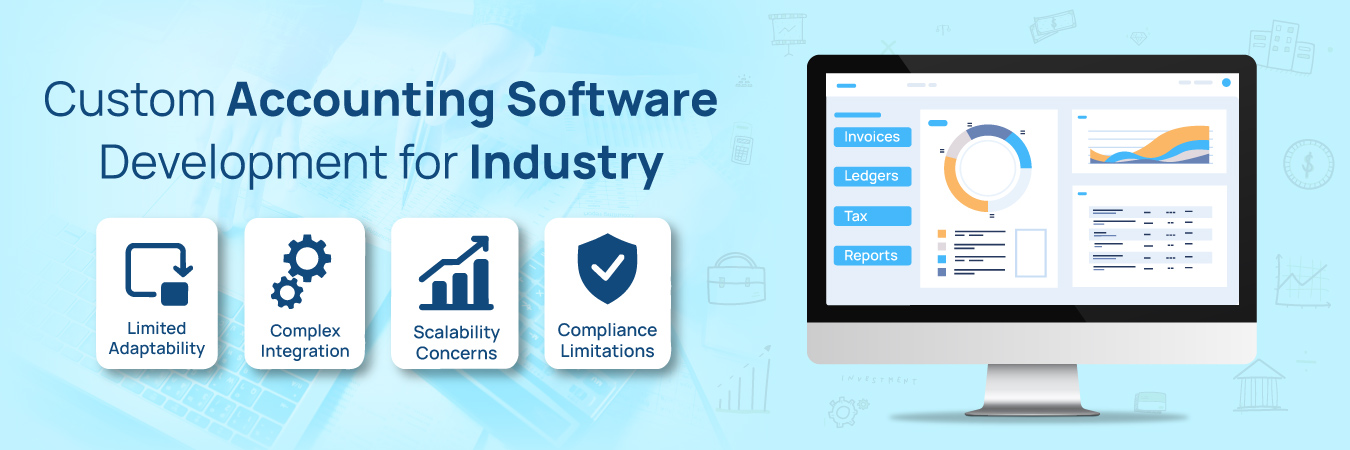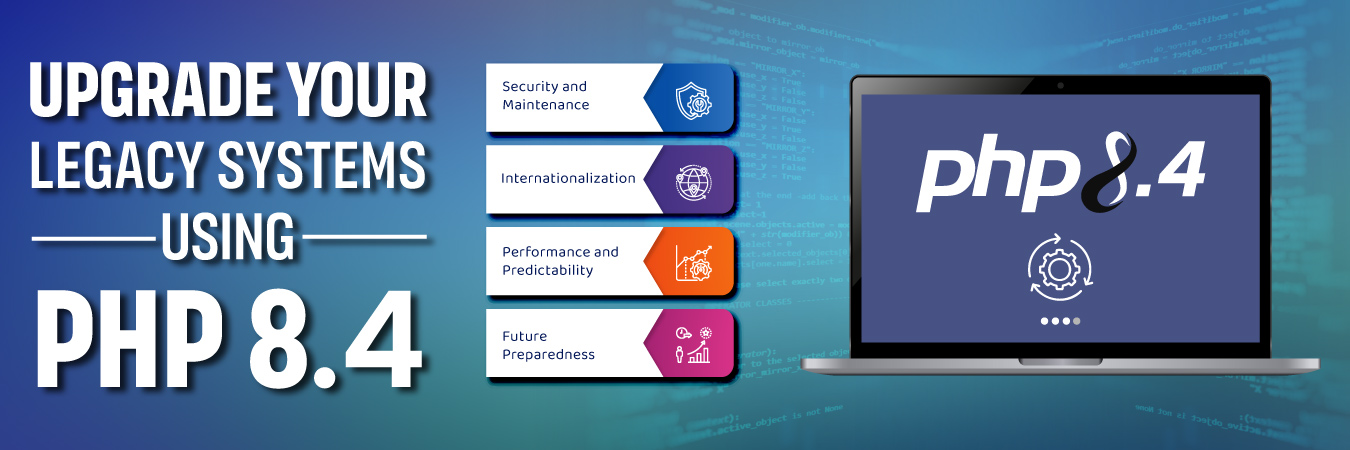
Java Vs. Kotlin for Android Applications – What to Choose?
Most Android apps are written in Java! But did you know 94-96 percent of the top 1,000 Android applications have Kotlin code? Java has been around since time immemorial and is trusted by about 44-45 percent of developers. But Kotlin also has proved its worth, making itself Kotlin-first. It is used by about six million developers globally.
These facts and figures are alluring as they are confusing. They bring companies to a junction where they have alternatives, but they cannot make the right choice (in their context) between Java vs. Kotlin. If you also are stuck in such a dilemma, reading this blog that highlights some significant differences between Java and Kotlin can help.
What is Java?
Java is a robust, powerful, and straightforward object-oriented programming language. Developers worldwide use it to build and manage Android applications, server apps, web applications, embedded systems, etc. It has been around for nearly three decades.
Java is best suited for Android applications. One crucial reason for it is that it is platform-independent. Hence, Java can run on any platform. The programming language has its runtime environment, an API, and a Java Runtime Environment. Most of Java’s features are available in open source.
What is Kotlin?
Kotlin is a relatively new player within the application development realm. It is a statically typed programming language that combines object-oriented programming language and functional programming. That makes it an apt choice for Android and server-side applications.
Kotlin originally intended to make coding in Java more productive. But after 2018, it evolved to become a separate programming language. It received Google’s support and emerged as an alternative to Java for Android application development.
Java Vs. Kotlin – 7 Noteworthy Differences
So, who wins the race between Java and Kotlin? Will we get a winner, or eventually find both programming languages on par with each other, resulting in the contest in a draw? Let’s look at some vital differences which you should know before making a choice.
1. Performance
Kotlin and Java compile to ByteCode, which runs on JVM. Hence, it is difficult to compare both concerning their memory usage. But Kotlin has some extra features on its side that make it more functional than Java. Besides, Kotlin’s Coroutines tool simplifies working with multi-threaded applications. But there’s a flip side to the coin as well. Kotlin compiles and executes a little slower than Java due to its plethora of features.
As for Java, it is more straightforward. It doesn’t have as many additional features. So, it compiles quicker than Kotlin. But as both outweigh each other in some or the other area, they both emerge as equally performant programming languages. So, that’s a tie!
2. Coding Speed
Now, let’s see if we get a winner here. Java has more coding processes than Kotlin. Thus, the developer doesn’t have to scratch their head as much while thinking of a solution. But on the other hand, Kotlin has a higher number of laconic constructions that don’t require developers to type as many codes. However, finding solutions in Kotlin is more time-consuming, thus signifying that the language has a greater cognitive load.
There isn’t much of a difference between the language’s coding speeds. Thus, again, we’ll end up with a tie between both!
3. Type of Data
Kotlin doesn’t require variable specification data type. But Java does. Declaring data type benefits in various ways. It includes easier identification of particular error types, accelerated arithmetic processing, and maximizing memory. Here, Java wins clearly!
4. Scalability
These days, many businesses grow quickly. But this rapid growth leads to many outgrowing the technology they use, resulting in inefficiencies, spoiled user experience, etc. Java is a famous programming language. But it isn’t as scalable.
On the other hand, Kotlin is a relatively contemporary innovation. Hence, it resonates more with new-age requirements that include scalability. Kotlin focuses more on scalability in its design, which helps improve the app’s performance even when the number of users swells or there’s a surge in the amount of traffic. So, when scalability is an essential requirement, which is, in many cases, Kotlin provides the edge.
5. Documentation Assistance
Java and Kotlin are equivalent in terms of documentation. But Java is a mile ahead of Kotlin, as it is an old programming language. So, finding a tutorial for Java is easier. It has a soft learning curve, and developers can find its official documentation from Oracle. But Kotlin, although younger than Java, has official documentation that is adequate to help developers know how to work with it. So, in this case, both are equally competent.
6. Talent Availability
Talent availability is a vital constraint driving the choice of a programming language to develop an Android application. Java ranks high on the list of the most-adored technologies, with about 44-45 percent of developers looking to continue with it. But Kotlin, at 62-63 percent, with all its competence, is way ahead in the race.
7. Development Cost Involved
Java compiles quickly with clean builds from 0 to 1. But as incremental builds are frequent in Agile development, this advantage of Java gets nullified.
On the other hand, Kotlin requires significantly fewer code lines than Java, thus saving a lot of development time. Besides, the code is less complex, shorter, and easier to maintain. These factors can translate to better performance. Additionally, Kotlin shortens the development time, thus proving to be more cost-effective than Java.
Java Vs. Kotlin – What to Choose? FidelSoftech Can Help!
Now, finally, we come to this crucial question. Honestly, there’s no clear winner between Java and Kotlin. Both are equally competitive programming languages.
Java is apt for large-sized apps with various features and functionalities expected to perform on multiple platforms. So, when do you use Kotlin? It is when performance is of paramount importance and when scalability is crucial. Besides, you can use Kotlin even when you have less development time on hand and when the budget is tight.
The above is general advice, though. For a more specific and contextual understanding of the choice of Java and Kotlin, connect with FidelSoftech. Our consultants will review your needs, objectives, budget, go-to-market time, resource availability, etc., to help you make the most informed and prudent choice. Write to us at sales@fidelsoftech.com. to connect with our consultants.
Ref. No – FB02231049
Related Blogs
Choosing Between Outsourcing vs Staff Augmentation for Software Development
Are you looking to develop a software solution for your company but wondering whether to go for outsourcing vs staff augmentation? Then, let us tell...
Custom Accounting Software Development for Industry-Specific Needs
Custom accounting software development becomes essential when businesses rely on accounting systems that promise universal compatibility,...
Upgrade Your Legacy Systems Using PHP 8.4 New Features
PHP gets even better! Yes. While already great, the latest PHP 8.4 release is yet another giant leap forward for the programming language. However,...



